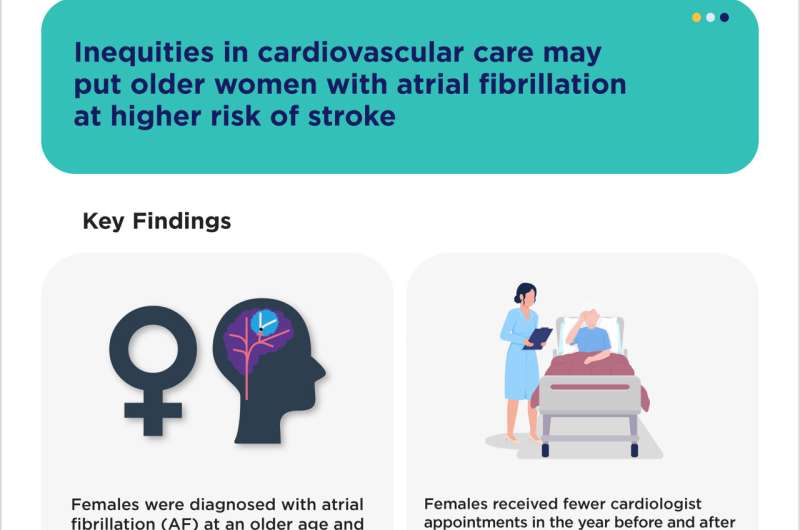This article has been reviewed according to Science X's editorial process and policies. Editors have highlighted the following attributes while ensuring the content's credibility:
fact-checked
peer-reviewed publication
proofread
Study suggests inequities in cardiovascular care are putting older females' heart health at risk

Higher stroke risk among females with atrial fibrillation may be related to sex-based disparities in cardiovascular care, according to a new study from Women's College Hospital, the Peter Munk Cardiac Center (PMCC) at University Health Network (UHN) and ICES.
Atrial fibrillation (AF) is a common type of irregular heart rhythm that is associated with a higher risk of stroke—after the age of 40, one in four strokes are caused by AF. Previous studies have found that female sex (assigned at birth) is a risk factor for AF-associated stroke. Recent research suggested that females are only at higher risk than males with AF if they have another factor predisposing them to stroke (such as older age, hypertension, or diabetes).
The reasons for this higher stroke risk in females has not been well-examined. The authors hypothesized this was because these risk factors were less well-treated in older females, rather than female sex intrinsically predisposing to this higher risk.
The population-based cohort study, published in the European Heart Journal, analyzed health records for people aged 65 and older recently diagnosed with AF in Ontario, Canada. The cohort included 354,254 people (49% female), with an average age of 78 years. The study was made possible through the Early Career Women's Heart and Brain Health Chair and a National New Investigator Award from the Heart and Stroke Foundation of Canada.
"After taking into account the age of the individual and differences in cardiovascular care, the data show that stroke risk was similar between males and females under the age of eighty, but that female sex was an independent risk factor over the age of eighty," says lead author Hifza Buhari, family medicine resident at the University of Toronto and former Temerty medical student at Women's College Hospital. "Females tend to be diagnosed with atrial fibrillation at older ages, and they may not be receiving adequate monitoring or treatment to reduce their stroke risk."
The data also show that, compared to males:
- Females were diagnosed more often in emergency departments (30% versus 25% for males)
- Females received fewer cardiologist appointments, both in the year before (12% versus 17%) and after (31% versus 37%) AF diagnosis.
- Females were also less likely to get LDL-C testing and be treated with statins, despite having higher LDL-C levels and higher BP than their male counterparts.
"Equalizing cardiovascular care for males and females is an important step towards healthier hearts and lives for everyone," says senior author Husam Abdel-Qadir, cardiologist at Women's College Hospital and Peter Munk Cardiac Center, University Health Network, and scientist with Women's College Research Institute, Ted Rogers Center for Heart Research, and ICES. "By addressing sex inequities, we can increase the likelihood that every individual receives the best chance at a heart-healthy future."
One limitation of the data is that the researchers could not account for variables such as race, AF type or severity, and other clinical factors, which may had led to an underestimation of inequities in cardiovascular care that disproportionately affect older females.
"This study is another reminder that heart disease and stroke are not male diseases. Despite there being widespread appreciation that females with AF are at higher stroke risk than males, they are getting less cardiovascular care with real consequences. These data emphasize that females, particularly those at older ages, require appropriate care to reduce their risk of these serious diseases," says Dr. Abdel-Qadir.
More information: Husam Abdel-Qadir et al, Stroke risk in women with atrial fibrillation, European Heart Journal (2023). DOI: 10.1093/eurheartj/ehad508





















